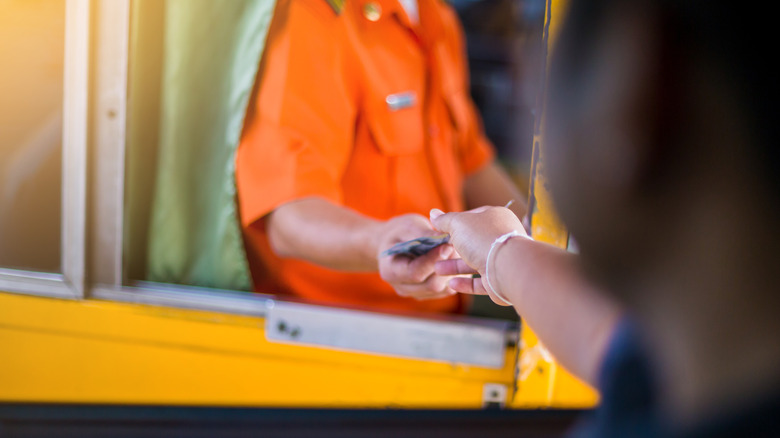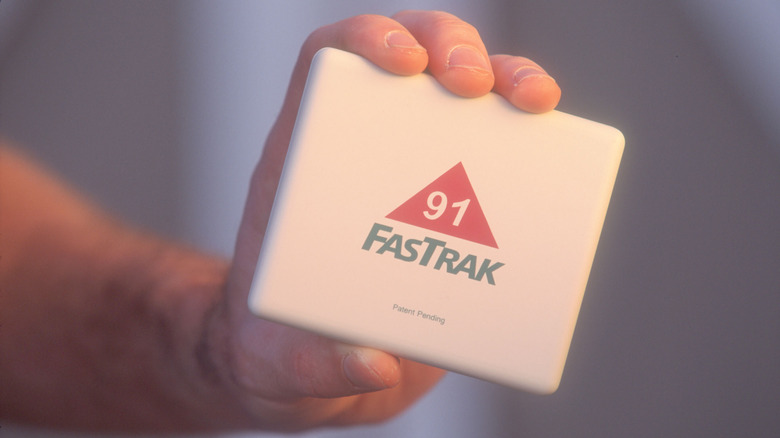How To Avoid Getting Charged With Surprise Rental Car Toll Fees
If you're reading this headline and thinking there's no way rental car companies could find yet another way to nickel and dime their customers, well, we hate to be the bearers of bad news, but it's true. They are called toll fees, and they're in addition to the actual cost of the toll. With that being said, there are ways to get around them. Let's break it down.
Toll roads are common throughout the U.S. and are used to pay for the upkeep of current roads and the construction of new ones. But where do rental car companies come into this mess? Well, now that many tolls are going cashless, rental car companies are taking advantage of drivers by charging a daily fee to use their transponders — not including the cost of toll road itself. Some even charge a fee per toll.
While it makes sense to pay for the toll roads, you might be wondering, why the heck is there a daily fee? According to rental car companies, it's essentially a processing or administrative fee. In a world of automated systems, this sounds like a load of bunk. So, instead of sitting back and accepting this price gouging, how do you avoid it? We've have all the answers below.
The truth about toll fees — and how to avoid them
The first and most obvious way to avoid getting charged toll fees is to avoid toll roads. While expressways can often be the quicker route to your destination, non-toll roads aren't always so far out of the way. How do you avoid them? Most navigation apps — like Google Maps, Apple Maps, and Waze — offer options to toggle on or off an "avoid tolls" feature. This way, you can compare your routes using, and not using, toll roads. If it seems excessively longer to avoid tolls, you might be better off just paying for the tolls and saving time and gas. However, this doesn't mean you still need to pay your rental car company the exorbitant daily fees to use them.
In most cases, you can tell your rental car company you don't want to pay their toll fees. This means you'll need to ensure one of two things: that the tolls on your route have cash payment options available, or that you can purchase a personal transponder to use for your trip and pay the tolls yourself directly. While cash tolls are still available, they're becoming less and less common, which is why it might be best to just spring for your own transponder. If that's what you decide to do, here's what you need to know.
Using your own transponder to avoid toll fees
By using your own toll transponder, you'll avoid paying the ridiculous daily fees charged by rental car companies to use their transponders and process tolls — but which one should you purchase for your trip? If you're traveling in the Northeast of the U.S., you can use the E-ZPass. Some states charge a yearly fee or a monthly maintenance fee, but others don't charge any extra fees besides the cost of the transponder or opening an account. This varies from state to state, as well as the toll fees for in-state and out-of-state transponders. So, if you're going to be driving across state lines, do a little due diligence to see what your total costs might come out to.
If you're driving in Oklahoma, Kansas, or Texas, you can use EZ Tag. When purchasing a physical transponder, there's a $20 minimum fee to open and fund a toll account. However, if you're primarily driving in Texas, you can download their app, register your rental car, and pre-fund your toll account before you begin driving. This is by far way easier than using a physical pass and cheaper than paying your rental car company.
Finally, if you're driving in California, you can use a FasTrak pass. Conveniently, you can order these online or purchase them in California at Costco or Walgreens. They cost $25, along with a $5 security deposit, and it's very easy to assign your rental car to your account online.


